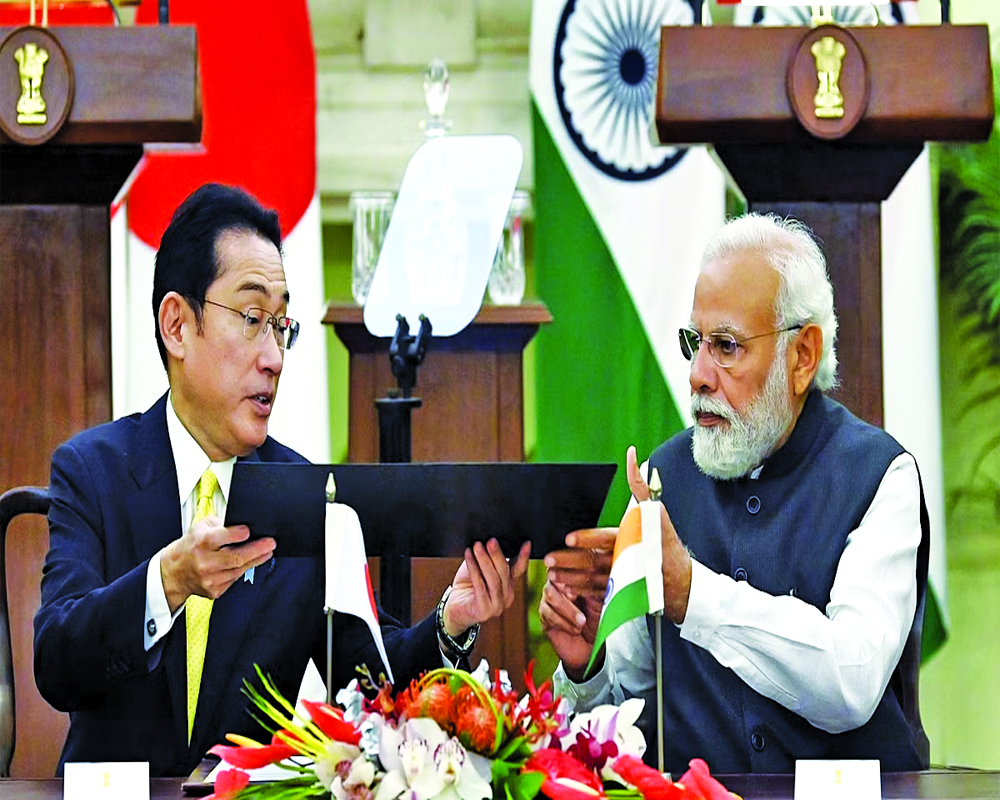The strengthening of the Indo-Pacific strategy
This week marked two significant developments in Asia. Each of the two powerful leaders from Asia, albeit with differing approaches, developed their own agendas for shaping the geopolitics of the region as they moved westward. The first was Japanese Prime Minister Fumio Kishida’s state visit to New Delhi, where he talked about the revised Indo-Pacific strategy, an older version of which Japan has been pursuing diligently for nearly one and half decades. The second was the state visit of Chinese premier Xi Jinping, to the Russian capital, the first major visit by any significant global leader, since the Russian invasion of Ukraine where it was a reiteration of growing Sino-Russia bonds, for a better Eurasia.
In many ways, Japan, more specifically, ex-PM Shinzo Abe, was the author of the Indo-Pacific strategy, nearly fifteen years ago, when he articulated the conjoined at the hip, future, for all nations dotting the Indian and Pacific oceans. In his now famous speech to the Indian Parliament in 2007, titled "The confluence of the two seas”, a blueprint for the now-established geopolitical strategy for many nations in the Indo-Pacific was outlined. Incidentally, during the same speech, Abe made the point about broader cooperation between the largest democracies in Asia. This point later on emerged as the QUAD, comprising the US, Japan, Australia and India.
In several pitches during the intervening years, made to various regional groupings and multilateral forums, Abe continued to push on his vision of a free and open Indo-Pacific founded primarily on three pillars. Pillar 1 emphasises the need for the establishment of the rule of law, freedom of navigation by air and sea and free trade for the region. Pillar 2 emphasises economic prosperity by promoting broader regional connectivity through building roads, ports, and digital linkages as well as creating the human bridge through increased people-to-people connectivity. This pillar also looks at the harmonisation of trade rules thereby facilitating more access to each other’s goods and services. The third pillar focuses on peace and security in the region. It has a clear focus on maritime security, law enforcement, prevention of terror activities, sharing intelligence, providing disaster relief etc. In spite of this, it took Japan years of patient pitching before the Indo-Pacific became the focus of US and EU foreign policy. It got the attention it deserved, with the changing geo-strategic situation in 2020, which showcased the vulnerabilities of relying on a China-monopolised critical supply chain system and the stiff restrictions imposed by China due to its zero Covid policy.China wasn’t willing to cooperate with other nations during disaster. Japan was particularly shocked at the state visit of Vladimir Putin to Beijing, right before he invaded Ukraine, which established the “no limits friendship” between Russia and China.
It was almost a moment, which sharply divided the world into blocks that supported Russia and China and one that was led by the US and western allies. Although not a 21st-century version of the cold war yet, this rift will continue to dictate global affairs for some years. The Sino-Russia partnership has also empowered China, as it can utilise a second UN security council permanent member, Russia, to push its agenda through multilateral platforms. Meanwhile, observing the Russian invasion of Ukraine, China can reevaluate its strategy regarding unilaterally changing geographical boundaries with several neighbouring nations (including India).
The two-state visits, therefore assume significance, as the first one, reiterates India and Japan’s commitment to deepening their engagement for an open safe, transparent rules-based Indo-Pacific while reiterating their commitment to increased cooperation with regional groups such as ASEAN. It re emphasised the centrality of India to Japan’s Indo-Pacific strategy, particularly in a year when Japan is the chair of G7 and India has the G20 presidency, two significant platforms for cooperation and future road mapping. The conference in Moscow, has raised enough concerns across global capitals, to further energise their Indo-Pacific strategies.
(The author is a foreign affairs commentator)
























